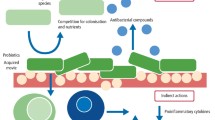Abstract
Data sources
Medline, Cochrane Central Register of Controlled Trials and Science Direct databases. Hand searches of the Journal of Clinical Periodontology, Journal of Periodontology, Journal of Periodontal Research, Journal of Dental Researc h and reference searches of the included articles and related reviews.
Study selection
Two authors independently screened the literature to identify relevant randomised controlled trials (RCTs) on patients with chronic periodontitis (CP) treated with SRP and probiotic, SRP and placebo or SRP alone, with pocket probing depth (PPD) as the primary outcome. No minimum follow-up period was set for study inclusion.
Data extraction and synthesis
Risk of bias assessment was done independently using the Cochrane tool. Data were extracted using a predefined form. Weighted mean differences and 95% confidence intervals were calculated and meta-analysis conducted using fixed and random effects models.
Results
Three of the four included studies were included for meta-analysis. All three studies showed significant heterogeneity though they were rated as having low risk of bias. The number of patients ranged between 30 and 40 and follow-up duration ranged between 42 and 360 days amongst these studies. The reported primary outcomes were PPD and clinical attachment level (CAL); bleeding on probing, gingival index, gingival bleeding index, need for surgery and risk of disease progression were reported as secondary outcomes.
Overall, the authors did not find a statistically significant reduction in PPD [−0.46mm, (−0.95, 0.02; p = 0.06)] in the probiotic group. However, when pockets were stratified as moderate and deep pockets, probiotic group showed significant reduction in PPD in moderate [0.18, (−0.28, −0.07; p = 0.01)] and deep pockets [−0.67, (−0.85, −0.49; p<0.001)]. The overall CAL gain [−0.42mm (−0.68, −0.16; p = 0.002)] and reduction in BOP [−14.66% (−24.49, −4.83; p = 0.003)] were significant in the probiotic group short-term.
Conclusions
The meta-analysis shows some beneficial effect of Lactobacillus reuteri with reduction of PPD especially in deep periodontal pockets, CAL gain was similar to other adjuncts.1, 2 However, studies with larger number of patients and longer-term follow-up are needed to confirm these findings.
Similar content being viewed by others
Commentary
The SR by Martin-Cabezas et al. addressed a focused clinical question ‘What is the short-term clinical influence of probiotic as an adjunctive therapy to SRP, in terms of PPD reduction and CAL gain, when compared with SRP alone or in combination with placebo in the treatment of CP in humans?’ The authors adhered to PRISMA guidelines3, 4 for preparing this systematic review. Overall, the study has been conducted and reported well. The authors searched multiple databases, journals and bibliography of included articles and review articles. However, they did not include grey literature. They appropriately restricted their included studies to four randomised controlled trials. All studies were assessed to have low risk of bias. Only three studies were included in meta-analysis because two studies were performed in same institution and a subgroup of patients overlapped between these studies5,6 The probiotic tested in all studies was ‘L. reuteri (strains DSM17938 and L. reuteri ATCC PTA529; Prodentis; BioGaia, Lund, Sweden)’ which was taken as two lozenges twice daily for three weeks in two studies; for 12 weeks in one study, and for three weeks, starting at 21 days after SRP. Differences in drug regimen, definition of CP, quadrant or full mouth SRP, parallel or split-mouth study design and follow-up period (42-360 days) contributed to significant heterogeneity among the included studies. All studies were funded by BioGaia® (Sweden), a probiotic company. The authors rightfully acknowledge the limitations of the evidence due to heterogeneity, small number of studies and short-term follow-up period. However, the authors' discussion on the effect of probiotics as similar to other adjuncts (systemic antibiotics, sub-antimicrobial-dose doxycycline and chlorhexidine chips) used along with SRP described in the recent meta-analysis and clinical practice guideline by Smiley et al.1, 2 is premature. Multiple RCTs were available for the majority of adjuncts analysed in Smiley et al. prior to publication of clinical practice guidelines. With very limited studies on probiotics and the fact that all four included studies only tested L. reuteri, the comparative effectiveness of probiotics to already recommended adjuncts needs to wait until robust RCTs are published.
Practice point
-
Significant heterogeneity among the few studies limits the strength of conclusions regarding the efficacy of probiotics as an adjunct in the treatment of CP.
-
Using probiotics as an adjunct to SRP in deep periodontal pockets can be considered given a trend towards clinical benefit as well as low cost or harm.
References
Smiley CJ, Tracy SL, Abt E, et al. Systematic review and meta-analysis on the nonsurgical treatment of chronic periodontitis by means of scaling and root planing with or without adjuncts. J Am Dent Assoc 2015; 146: 508–524.
Smiley CJ, Tracy SL, Abt E, et al. Evidence-based clinical practice guideline on the nonsurgical treatment of chronic periodontitis by means of scaling and root planing with or without adjuncts. J Am Dent Assoc 2015; 146: 525–535.
Moher D, Liberati A, Tetzlaff J . Altman DG ; PRISMA Group. Preferred reporting items for systematic reviews and meta-analyses: the PRISMA statement. PLoS Med 2009; 6: e1000097.
Liberati A, Altman DG, Tetzlaff J, et al. The PRISMA statement for reporting systematic reviews and meta-analyses of studies that evaluate health care interventions: explanation and elaboration. PLoS Med 2009; 6: e1000100.
ince G, Gürsoy H, ipçi ŞD, Cakar G, Emekli-Alturfan E, Yılmaz S . Clinical and Biochemical Evaluation of Lozenges Containing Lactobacillus reuteri as an Adjunct to Non-Surgical Periodontal Therapy in Chronic Periodontitis. J Periodontol 2015; 86: 746–754.
Tekce M, Ince G, Gursoy H, et al. Clinical and microbiological effects of probiotic lozenges in the treatment of chronic periodontitis: a 1-year follow-up study. J Clin Periodontol 2015; 42: 363–372.
Author information
Authors and Affiliations
Additional information
Address for correspondence: Olivier Huck, Department of Periodontology, 8 rue Sainte-Elisabeth, 67000 Strasbourg, France. E-mail: huck.olivier@gmail.com
Martin-Cabezas R, Davideau JL, Tenenbaum H, Huck O. Clinical efficacy of probiotics as an adjunctive therapy to non-surgical periodontal treatment of chronic periodontitis: a systematic review and meta-analysis. J Clin Periodontol 2016; 43: 520–530.
Rights and permissions
About this article
Cite this article
Kumar, S., Madurantakam, P. Limited evidence shows short-term benefit of probiotics when used as an adjunct to scaling and root planing in the treatment of chronic periodontitis. Evid Based Dent 18, 109–110 (2017). https://doi.org/10.1038/sj.ebd.6401270
Published:
Issue Date:
DOI: https://doi.org/10.1038/sj.ebd.6401270



